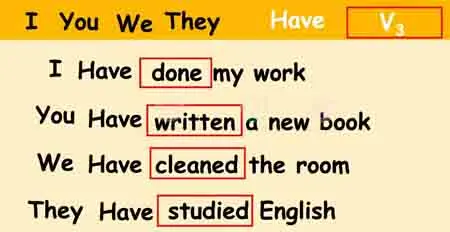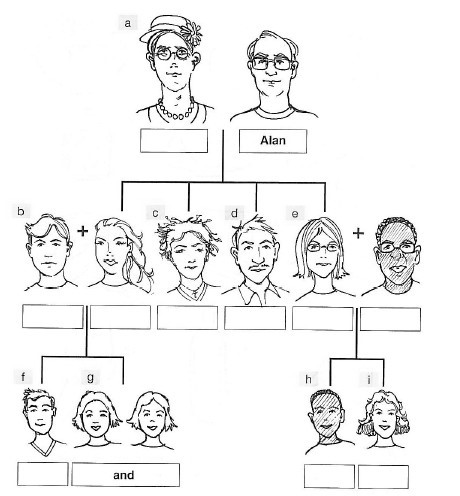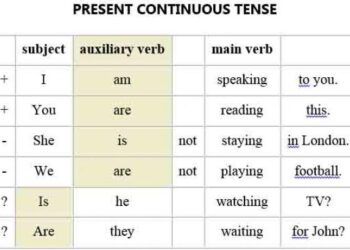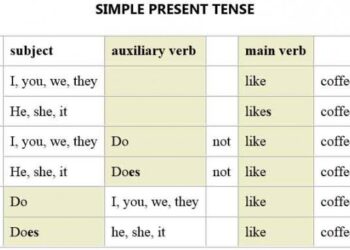Present perfect tense dalam bahasa inggris ini digunakan untuk menyatakan bahwa pekerjaan yang dibuat telah selesai pada saat kalimat dibuat atau kejadian masa lalu yang ada hubungannya dengan sekarang.
Pendapat lainnya juga mengatakan bahwa penggunaan present perfect tense dalam bahasa inggris adalah suatu bentuk kata kerja yang digunakan untuk menyatakan suatu aksi atau situasi yang telah dimulai di masa lalu dan telah selesai pada suatu titik waktu tertentu di masa lalu atau masih berlanjut sampai sekarang.
-
Pola Kalimat Present Perfect Tense
| Verbal | Sentences |
| (+) S + have/has + V-3 + O | (+) We have visited him. |
| (-) S +-have/has + not + V-3 + 0 | (-) we have not/haven’t visited him |
| (?) Have/has + S + V-3 + O? | (?) Have we visited him? |
| Nominal | Sentences |
| (+) S + (have/has) + been + ANA | She has been here |
| (-) S + (have/has) + not + been + ANA | She has not been here |
| (?) (Have/has) + S +been + ANA | Has she been here? |
-
Present Perfect Tense Verbal sentence:
(+) S+HAVE/HAS+V3
(-) S+HAVE/HAS NOT+V3
(?) S+HAVE/HAS+S+V3?
Example verbal sentence:
Example 1.
(+) we have lived here for 4 years
(-) We haven’t lived here for 4 years
(?) Have we lived here for 4 years?
Yes, we have/No, we haven’t
Example 2.
(+) I have studied biology for several minute ago
(-) I haven’t studied biology for several minute ago
(?) Have you studied biology for several minute ago?
Yes, I have/No, I haven’t
Example 3.
(+) I have cleaned my bedroom for several minute
(-) I have cleaned my bedroom for several minute
(?) Have you cleaned your bedroom for several minute?
Yes, I have/No, haven’t
Example 4.
(+) He has readied a book for four minute
(-) He hasn’t readied a book for four minute
(?) Has he readied a book for four minute?
Yes, he has/No, he hasn’t
Example 5.
(+) she has adjusted television
(-) She has not adjusted television
(?) Has she adjusted television?
Yes, she has/No, she hasn’t
-
Present Perfect Tense Nominal sentence:
(+) S+HAVE/HAS+BEEN+(NOUN,ADJ,ADV)
(-) S+HAVE/HAS+NOT+BEEN+(NOUN,ADJ,ADV)
(?) HVE/HAS+S+BEEN+(NOUN,ADJ,ADV)
Example nominal sentence:
Example 1.
(+) she has been beautiful since she was child
(-) She has not been beautiful since she was child
(?) Has she beautiful since she was child?
Yes, she has/No, she hasn’t
Example 2.
(+) He has been healthy since a week ago
(-) He hasn’t been healthy since a week ago
(?) Has he been healthy since a week ago?
Yes, he has/No, he hasn’t
Example 3.
(+) she has written the letter
(-) She hasn’t written the letter
(?) Has she written the letter?
Yes, she has/No, she hasn’t
Example 4.
(+) she has been fat since she was child
(-) she has not been fat since she was child
(?) Has she been fat since she was child?
Yes, she has/No, she hasn’t
Example 5.
(+) I have been a doctor for 15 years
(-) I haven’t been a doctor for 15 years
(?) Have you been a doctor for 15 years?
Yes, I have/No, I haven’t
-
Kalimat Tanya (interrogative)
Kalimat tanya (interrogative) dibentuk dengan menempatkan “have/has” di depan kalimat. dalam kalimat tanya, kata kerja selalu dalam bentuk past participle.
Contoh:
- Has your brother got a job? (Apakah saudaramu sudah mendapat pekerjaan?)
- Have you made a decision where you will continue your study? (Apakah kamu sudah membuat keputusan ke mana kamu akan meneruskan kuliahmu?)
-
Kalimat menyangkal (negative)
Kalimat menyangkal (negative) dibentuk dengan menambahkan “not” sesudah “have/ has” (have not/haven’t, has not/hasn’t) dan ditempatkan sesudah subjek kalimat. Contoh:
- I have not/haven’t done my report for this week. (Saya belum mengerjakan laporan saya untuk minggu ini.)
- She has not hasn’t typed the weekly report. (Dia belum mengetik laporan mingguan itu.)
- Father has not/hasn’t paid his installment for this month. (Ayah belum membayar cicilamrya untuk bulan ini.)
-
Kesesuaian Subject dan Auxiliary
verb yang digunakan dalam tenses ini adalah sebagai berikut :
- HAVE digunakan oleh subject I, you, we, dan they.
- HAS digunakan oleh subject she, he, dan it.
-
Keterangan Waktu Present Perfect Tense
Keterangan waktu yang biasa dipakai dalam tenses ini adalah:
- Already : sudah
- for : Selama
- since : Sejak
- ever : Pernah
- just : Baru saja
- recently : Baru-baru ini
-
Penggunaan Present Perfect Tense
Present perfect tense digunakan untuk menunjukkan suatu kejadian atau peristiwa yang terjadi pada waktu lampau dan masih berlangsung sampai sekarang.
Contoh 1 present perfect tense:
- We have occupied this house for seven years. (Kami sudah menempati rumah ini selama tujuh tahun)
- My brother has studied English for seven months. (Saudara saya sudah belajar bahasa Inggris selama tujuh bulan)
Present perfect tense digunakan untuk menunjukkan suatu kejadian atau peristiwa yang terjadi pada waktu lampau dan masih ada hubungannya dengan waktu sekarang atau akibatnya dapat dilihat/dirasakan sekarang.
Contoh 2 present perfect tense:
- My father has bought a new car. (Ayah saya sudah membeli sebuah mobil baru)
- Brenda has passed from senior high school. (Brenda sudah lulus dari sekolah menengah atas)
Present perfect tense juga digunakan dengan “this morning, this afternoon, today, this week, this month, this year” untuk menunjukkan bahwa sesuatu kejadian atau perbuatan telah dilakukan berulang kali.
Contoh 3 present perfect tense:
- I have tried to contact him three times today. (Saya sudah mencoba menghubunginya tiga kali hari ini)
- She has visited this country twice this month. (Dia sudah mengunjungi negara ini dua kali bulan ini)
Fungsi Present perfect tense |
Contoh Kalimat Present Perfect Tense |
|
Present perfect tense untuk mengungkapkan kejadian di masa lalu tanpa peduli kapan tepatnya terjadi. |
Can you recommend the most delicious seafood restaurant in this town? Yes, I’ve visited all of them. (Dapatkah kamu merekomendasikan restoran seafood paling lezat di kota ini? Ya, saya telah mengunjungi semuanya.) |
|
I’ve read this book. (Saya sudah membaca buku ini.) |
|
|
Present perfect tense untuk menunjukkan bahwa suatu aksi terjadi berulang kali dimasa lampau (adverb of number dapat digunakan). |
She has called you three times. (Dia sudah meneleponmu tiga kali.) |
|
Present perfect tense untuk mengungkapkan aktivitas atau situasi yang dimulai pada masa lampau kemudian dilanjutkan sampai sekarang (belum selesai). |
I have lived in Cilegon for 3 months. (Saya telah tinggal di Cilegon selama 3 bulan.) |
|
She has studied in French since April. |
|
|
My brother has worked already/lately/ up to now. |
|
|
Present perfect tense untuk membicarakan event yang baru saja terjadi (adverb “just” dapat digunakan). |
I’ve just sent you an email. (Saya baru saja mengirimkan kamu email.) |
|
The rain’s just stopped. (Hujan baru saja berhenti.) |
Exercise Present Perfect Tense
-
Put the following sentences into Present Perfect Tense. Use the words in parentheses!
-
- They … (complete) the new building.
- Father … (buy) a new car for his son.
- My secretary… (post) the letters.
- Mr. Smith … (sell) one of his cars.
- I believe that they … (transfer) the money.
-
Put the following sentences into negative!
-
- She has finished typing all the reports.
- Our translators have translated this novel into Indonesian.
- All of them have left the tiny village.
- One of my classmates has just celebrated her birthday.
- They have abandoned the burning ship.
-
Put the following sentences into interrogative!
-
- I have contacted his manager three times today.
- They have printed this best seller novel three times this year.
- We have occupied this new house for two months.
- My sister has visited our grandfather at this village many times.
- This old city has changed a lot since I left it thirty years ago.
FAMILY LIFE
‘My name’s Charlotte. I’m married to John. We have two children, Stephen and Sylvia. My mum’s name is Theresa ami my father is called Alan. I have two sisters and a brother – Emily, Rebecca and Michael. Emily’s married to Craig and they have a son called Freddie and twin daughters, Lizzie and Vicky.
2 What do they all say about family life? Choose the correct word tor each gap.
|
aunt |
cousin |
daughter |
grand children |
|
granddaughter |
grandfather |
grandmother |
grandson |
|
husband |
mother |
nephews |
nieces |
|
parents |
sisters |
son |
uncle wife |
Alan : My (a)…………… son, Michael, is teaching me to use a computer. I want to get on the Internet.
Theresa : It was my birthday last week. My (b)………………… Freddie made me a big chocolate cake.
Stephen ; My (c)…………………..Michael is great. He always buys me the best computer games.
Michael : I’ve got three (d)…………………………and two (e)………… Christmas is a very expensive time for me!
Craig : My (f) ‘s family is really nice. Her (g)…………… , Theresa, is great with the children.
Rebecca : Emily is always very tired. Her (h)……………. , Craig, never helps her with the twins.
Sylvia : My (i)……………. Emily is quite fat.
Freddie : I hate my (j)………………. , Lizzie and Vicky. They cry all the time. My (k)………………….., Stephen, is cool. He’s brilliant at football.
Theresa : I’m a bit worried about my (1)………….. Rebecca. She hasn’t got a job or a boyfriend at the moment.
Sylvia : Both my (m)…………… wear glasses when I grow up. wear glasses. I don’t want to
Freddie : My (n) is called Theresa and my(o)……………………. is called Alan.
Theresa : My five (p)……………… are the best thing in my life. I love those twins, Lizzie and Vicky.
Alan : My (q)…………….. Sylvia is a very clever girl. She’ll go far in life.














